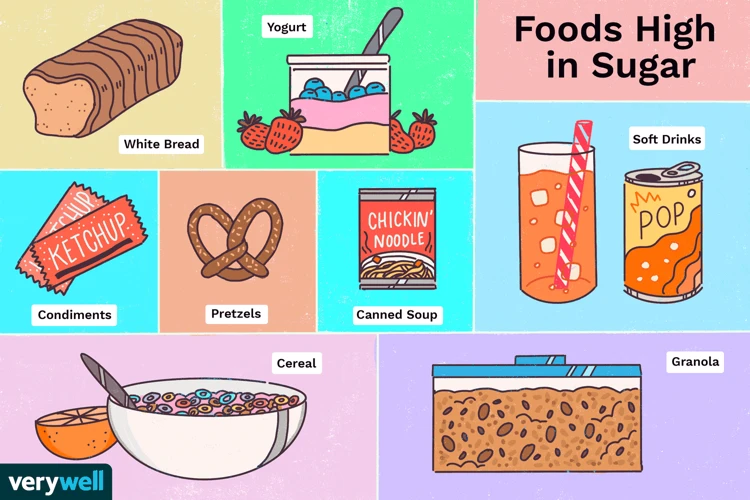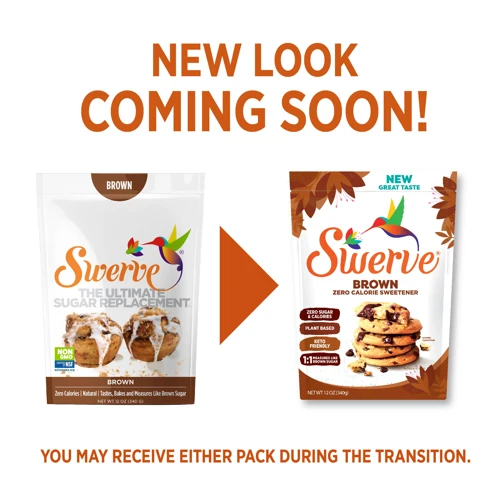Have you ever experienced intense sugar cravings? You’re not alone. Many people find it difficult to resist the allure of sugar, despite knowing the potential health risks associated with it. But why is sugar so addictive, and how can we manage our cravings for it? In this article, we’ll explore the science behind sugar addiction and the dangers of consuming too much sugar. We’ll also provide some healthier alternatives that can satisfy your sweet tooth without harming your health. Plus, we’ll share some tips for managing hunger cravings on a weight loss diet. So, if you’re ready to take control of your sugar cravings and improve your overall health, read on.
Understanding Sugar Cravings and Health Risks

For many of us, the temptation of sugary treats can be overwhelming. Despite our best intentions, we often find ourselves reaching for that extra cookie or spoonful of sugar. But have you ever stopped to think about why we crave sugar so much? And what are the health risks associated with consuming too much of it? In this section, we will delve into the science behind sugar addiction and the potential dangers of a diet high in sugar. By understanding the root causes of our cravings and the risks of overindulging, we can make more informed choices about what we eat and how much.
Why Sugar is Addictive
Sugar is addictive due to several factors. Here are some reasons why you might crave sugar:
- Brain chemistry: Sugar triggers the release of dopamine in the brain, which activates the reward centers and creates a feeling of pleasure. Over time, the brain requires more sugar to produce the same amount of dopamine, leading to cravings and addiction.
- Blood sugar levels: Eating sugar causes a spike in blood sugar levels, followed by a crash. This crash can lead to feelings of fatigue and cravings for more sugar to maintain energy levels.
- Stress: When stressed, the body releases cortisol, which can increase blood sugar levels and cause cravings for sugar.
- Availability: Sugar is readily available in many processed and packaged foods, making it easy to consume too much without realizing it.
These factors can contribute to a vicious cycle of sugar addiction and cravings. However, understanding the reasons behind sugar cravings can help you to make healthier choices.
Health Risks Associated with High Sugar Intake
Consuming high amounts of sugar can have detrimental effects on one’s health. Here are some of the health risks associated with high sugar intake:
- Increased risk of obesity: Sugar consumption plays a significant role in weight gain and obesity. Excess sugar intake leads to an increase in the body’s insulin levels, which promotes fat storage.
- Type 2 diabetes: High sugar intake leads to a resistance of insulin, causing the body to produce more insulin to regulate blood sugar levels. Over time, the body can become overwhelmed, leading to type 2 diabetes.
- Heart disease: High sugar consumption can increase levels of triglycerides, a type of fat found in the blood. Increased levels of triglycerides can lead to an increased risk of developing heart disease.
- Dental problems: Sugar is the primary cause of tooth decay. Consuming sugary foods and drinks promotes the growth of bacteria in the mouth, leading to tooth decay.
- Inflammation: High sugar intake can cause chronic inflammation in the body, leading to an increased risk of developing chronic diseases such as cancer, arthritis, and dementia.
By reducing sugar consumption and opting for healthier alternatives, individuals can reduce their risk of developing these health problems.
Healthy Sugar Alternatives that can Curb Hunger

When it comes to curbing hunger and satisfying your sweet tooth, reaching for refined sugar-laden treats isn’t always the healthiest choice. Luckily, there are plenty of healthy sugar alternatives that can help you manage your cravings while also providing nutritional benefits. From natural sweeteners like honey and maple syrup to creative snack options, these alternatives can make all the difference in your quest for a healthier diet.
Natural Sweeteners to Try in place of Refined Sugar
When it comes to replacing refined sugar with natural sweeteners, there are plenty of options to choose from. Below are some healthier sugar swaps you can try that won’t spike your blood sugar levels and can help you manage your hunger and cravings.
| Natural Sweetener | Description | Benefits |
|---|---|---|
| Stevia | A zero-calorie sweetener derived from the leaves of the stevia plant. | Does not raise blood sugar levels, has no calories and is sweeter than sugar so you need less of it. |
| Monk Fruit Extract | A zero-calorie sweetener derived from the monk fruit. | Does not raise blood sugar, has no calories and is said to have anti-inflammatory properties. |
| Honey | A natural sweetener made by bees from the nectar of flowers. | Contains antioxidants, may help with allergy symptoms, and has a lower glycemic index than sugar. |
| Maple Syrup | A natural sweetener made from the sap of the maple tree. | Contains antioxidants, has a lower glycemic index than sugar and can add flavor to dishes. |
| Coconut Sugar | A natural sweetener made from the sap of coconut palm trees. | Has a lower glycemic index than sugar, contains small amounts of nutrients like iron, zinc, and calcium, and adds a rich flavor to food. |
When using natural sweeteners, it’s important to pay attention to the serving size and be mindful of how much you add to your food and drinks. While they may be healthier alternatives to refined sugar, they are still a form of sugar and can contribute to excess calorie intake if consumed in large amounts.
Healthy Snacks to Achieve Satisfaction without Eating Sugar
When it comes to satisfying hunger, it’s important to choose the right snack that won’t spike your blood sugar levels. Nuts and seeds are great options as they are high in protein and healthy fats, which will help you feel full for longer. Try snacking on almonds, walnuts or pumpkin seeds.
If you’re looking for something sweet, fruit is a good option. They contain natural sugars that are healthier than processed sugars. Some great choices include berries, apples, and peaches. You can also try grape tomatoes or sliced cucumbers with hummus for a savory snack.
Another option is vegetables. Carrots and celery sticks with almond butter or guacamole will not only satisfy your hunger but also provide you with essential vitamins and minerals.
For those who love to snack on chips and dips, try kale chips or baked sweet potato chips with hummus or guacamole.
Lastly, hard-boiled eggs and low-fat cheese are high in protein and provide a satisfying snack option. Just remember to choose snacks that are low in sugar and high in nutrients to achieve satisfaction without the negative health effects associated with sugar.
Tips for Managing Hunger Cravings on a Weight Loss Diet
Embarking on a weight loss journey can be a challenging task, especially when it comes to managing hunger cravings. It’s essential to find ways to curb those sudden urges to snack, as overeating can sabotage your weight loss progress. However, there are various tips and tricks to help you manage your hunger cravings while on a weight loss diet. From incorporating protein-rich foods to mindful eating, implementing these strategies can help you achieve your weight loss goals without feeling deprived or hungry. Let’s explore some of these effective tips and tricks in detail.
Protein-Rich Foods for Boosting Fullness
One effective way to manage hunger cravings while on a weight loss diet is by incorporating protein-rich foods into your meals. Protein is known for its ability to boost feelings of fullness and reduce hunger pangs, which can prevent overeating and lead to weight loss.
Below is a table outlining some protein-rich foods that can aid in managing hunger:
| Protein-Rich Foods | Protein Content (per 100 grams) |
|---|---|
| Chicken Breast | 31 grams |
| Soybeans | 36 grams |
| Greek Yogurt | 10 grams |
| Cottage Cheese | 11 grams |
| Beef | 26 grams |
| Eggs | 13 grams |
| Tuna | 30 grams |
| Lentils | 9 grams |
It’s important to note that different sources of protein may have varying effects on satiety levels, so it’s best to experiment with different options to find what works best for your body. Additionally, pairing protein-rich foods with fiber-rich vegetables or whole grains can further enhance feelings of fullness and satiety.
Incorporating protein-rich snacks, such as nuts or jerky, into your diet can also help curb hunger cravings and prevent overeating. Incorporating protein into your meals and snacks can be an effective way to manage hunger cravings and promote weight loss.
Drinks that can suppress Hunger Pangs
Drinks can be great allies when it comes to managing hunger pangs. Here are some beverages to consider incorporating into your diet:
- Water: Often times we mistake thirst for hunger. Drink a glass of water before reaching for a snack to see if that curbs your cravings.
- Green Tea: This tea is rich in antioxidants and contains a compound called epigallocatechin gallate which has been shown to boost metabolism and decrease appetite.
- Coffee: Coffee contains caffeine which is a natural appetite suppressant. Avoid adding sugar or cream to keep it as healthy as possible.
- Vegetable Juice: Drinking vegetable juice, especially before meals, can help you feel full and decrease your desire to eat excessive amounts.
- Apple Cider Vinegar Drink: Diluting apple cider vinegar in water and drinking it before a meal has been shown to reduce hunger and decrease overall food intake.
It’s important to remember that drinks should not be a substitute for food. However, incorporating these hunger-curb beverages into your diet can be a helpful tool when trying to manage cravings and reduce overall calorie intake.
Ways to Practice Mindful Eating to Avoid Cravings during Restricted Calorie Diets
One effective way to avoid cravings during restricted calorie diets is to practice mindful eating. Mindful eating is a technique that involves paying attention to the present moment and being fully present while eating. This not only helps to control cravings but also improves the overall eating experience.
Here are some ways to practice mindful eating:
| 1. Eat slowly and chew thoroughly. | Chewing food thoroughly helps to break it down into smaller particles, which makes digestion easier and helps to avoid overeating. |
|---|---|
| 2. Focus on the flavors and textures of the food. | Take time to appreciate the flavors and textures of what you are eating. Savor each bite and notice the different tastes and textures in your mouth. |
| 3. Avoid distractions while eating. | Avoid watching TV, working on the computer or phone, or engaging in any other activity that distracts you from your food. This can lead to mindless eating and overeating. |
| 4. Listen to your body. | Pay attention to your body’s cues of hunger and fullness. Stop eating when you are satisfied, not when you are stuffed. |
| 5. Practice gratitude. | Before you eat, take a moment to express gratitude for your food. This helps to create a positive mindset around eating and can improve the overall eating experience. |
By incorporating these mindful eating practices into your weight loss diet, you can avoid cravings and maintain a healthy relationship with food.
Conclusions
After exploring the addictive nature of sugar and the various health risks associated with overconsumption, it is clear that managing sugar cravings is crucial for maintaining a healthy lifestyle. However, completely cutting sugar out of one’s diet is not always feasible or necessary.
Instead, opting for healthier sugar alternatives such as natural sweeteners and snacks that satisfy without refined sugar can be a great solution. This helps to reduce the risk of health problems such as obesity, diabetes, and heart disease.
In order to manage hunger cravings while on a weight loss diet, incorporating protein-rich foods and drinks that suppress hunger pangs can be helpful. It is also important to practice mindful eating and restrict calorie intake in a healthy and sustainable way.
The bottom line is that cutting down on sugar and managing cravings is a crucial part of a healthy lifestyle. It can be challenging at times, but with the right alternatives and strategies, it is achievable. By prioritizing nutrition and making small changes to daily habits, it is possible to achieve optimal health and well-being.
Frequently Asked Questions
How can I overcome sugar cravings?
You can try replacing sugar with healthier alternatives like natural sweeteners and consuming protein-rich foods that promote fullness. Also, practicing mindful eating habits can help avoid cravings.
What are natural sweeteners?
Natural sweeteners are sugar substitutes that are sourced from plants and fruits such as stevia, honey, and maple syrup.
Are artificial sweeteners healthier than sugar?
Artificial sweeteners are low in calories, but they have been associated with health risks such as cancer and digestive problems. It’s better to opt for natural sugar alternatives.
What are some healthy snack options to satisfy my cravings?
You can try snacking on fruits, nuts, seeds, or unsweetened yogurt instead of sugary snacks.
Can drinking water help curb hunger cravings?
Yes, drinking water before a meal can help promote fullness and reduce hunger cravings.
What are some protein-rich foods that can help curb hunger?
You can try consuming foods like eggs, chicken, beans, and nuts to promote fullness and reduce hunger cravings.
What drinks can help suppress hunger pangs?
Green tea, herbal tea, and water with lemon can help suppress hunger pangs and promote fullness.
What is mindful eating, and how can it help manage cravings?
Mindful eating involves paying attention to the taste, texture, and smell of food while eating. This practice can help reduce overeating and avoid cravings caused by emotional triggers.
Can I still consume sugar in moderation?
Yes, consuming sugar in moderation is fine, but it’s better to opt for natural sugar alternatives and avoid processed sugary foods.
What are the health risks associated with high sugar intake?
High sugar intake has been linked to health risks such as obesity, type 2 diabetes, heart disease, and dental problems.







